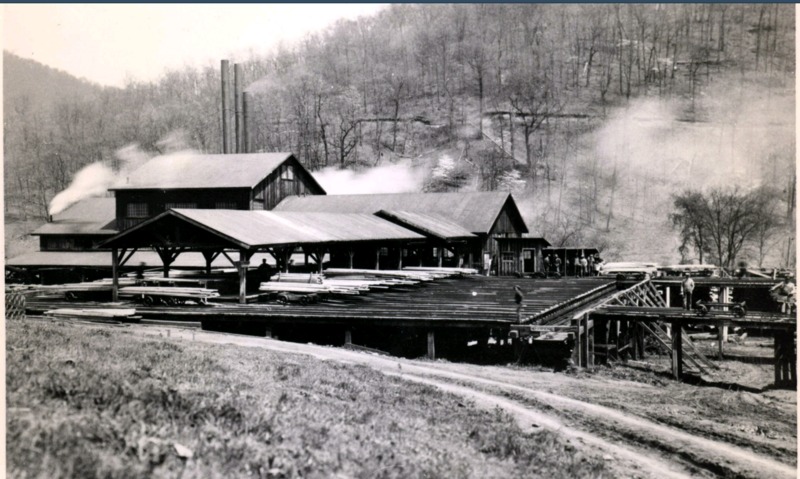Logging Companies
Blackwood Lumber Company
Blackwood Lumber Company, a subsidiary of Keyes-Walker Lumber Company out of Philadelphia, bought 45,575 acres of land in Jackson County from Scotts Creek (North of Sylva) down to Canada. This covered much of modern day Sylva, Webster, Cullowhee, Forest Hills, Caney Fork, and East LaPorte. A sawmill was built at East LaPorte along the banks of the Tuckaseegee River. Blackwood also built a small railroad that ran 12.5 miles from Sylva to East LaPorte. It was called the Tuckaseigee and Southeastern Railway Company (The T & SE).[1]
The T & SE was beneficial to Jackson County as a whole, not just Blackwood. It helped students at Cullowhee Normal and Industrial School travel more freely. It also provided access for more people to attend high school.[2]
Blackwood also built the Caney Fork Logging Railway Company, a railway that connected the T & SE with the timber reserves of Caney Fork. This helped Blackwood tap into more resources across the county.[3]
Blackwood was the one and only mill town in Jackson County. It was built in East LaPorte surrounding the sawmill. There were about 75 buildings in total, including a church, a school, boarding houses, a commissary, company offices, and a train depot. There was a healthy amount of paternalism associate with the mill town, which was typical. Employees and their families shopped at the company commissary and lived in its houses. They played baseball for the company team against other companies in nearby counties such as Haywood and Swain. Blackwood also had picnics and dances, in which they would include students from Cullowhee Normal and Industrial School (modern day WCU).[4]
Over all, the employees of Blackwood Lumber Company were content. They were paid well at $60-65 (minimum) a month. They also had electricity and indoor plumbing before anyone else in Jackson County. Blackwood was very successful until the Great Depression.[5]
Many unskilled laborers were laid off in 1929 and the early 1930s. Many people were able to keep their jobs, however, as they were skilled laborers. Blackwood slowed it production during the early 1930s to weather the Depression. In 1933, the New Deal’s effects had already trickled down to Western North Carolina. Blackwood hired back many employees, but it could not turn much of a profit due to the Depression and the high costs associated with logging in general. In fact, the owners attempted to sell a lot of land to the Federal Government. The government took some land, and turned it into CCC camps, but would not buy all of it.[6]
The Caney Fork Logging Railroad Company was dismembered in 1935. The owner of Blackwood, Joseph Keyes, died in 1940. His wife inherited the company, and struggled for a few more years in trying to sell it. A fire burnt down the sawmill in 1945, and Blackwood was finally able to sell all its land to the Mead Paper Corporation of Ohio in 1946. This was the end of Blackwood Lumber Company and subsequently the end of the golden age of logging in Jackson County.[7]
